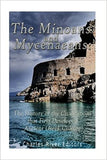The Miracle of Dunkirk: The History of the World War II Battle and Evacuation that Helped Save Britain from Nazi Germany
ISBN: 9781515079705
*Includes pictures
*Includes accounts of the fighting and evacuations written by soldiers on both sides
*Includes online resources and a bibliography for further reading
*Includes a table of contents
“The Navy, using nearly 1,100 ships of all kinds, carried over 335,000 men, French and British, out of the jaws of death and shame [...] We must be very careful not to assign to this deliverance the attributes of a victory. Wars are not won byevacuations. But there was a victory inside this deliverance […] we shall fight on the beaches, we shall fight on the landing grounds, we shall fight in the fields and in the streets, we shall fight in the hills […] until […] the New World, with all its power and might, steps forth to the rescue and the liberation of the old.” – Winston Churchill, June 4, 1940
“Blitzkrieg” or “Lightning War” describes the Third Reich's invasion strategy during its 1940 conquest of France not only due to the speed of the Wehrmacht advance but also its devastating effect on its ill-prepared adversaries. Mired in the paralyzing muck of plodding staff college military doctrine and demoralized as a nation by their appalling losses during World War I, the French succumbed in a few weeks to German skill and vigor. Moreover, after being lured into Belgium by a large-scale German feint, the British Expeditionary Force (BEF) and over a million French soldiers found themselves cut off by the main Wehrmacht thrust. Heinz Guderian and Irwin Rommel, among others, led their panzers on an 11-day dash from the Ardennes Forest to the coast, trapping vast numbers of Allied soldiers in Belgium and northeastern France.
*Includes accounts of the fighting and evacuations written by soldiers on both sides
*Includes online resources and a bibliography for further reading
*Includes a table of contents
“The Navy, using nearly 1,100 ships of all kinds, carried over 335,000 men, French and British, out of the jaws of death and shame [...] We must be very careful not to assign to this deliverance the attributes of a victory. Wars are not won byevacuations. But there was a victory inside this deliverance […] we shall fight on the beaches, we shall fight on the landing grounds, we shall fight in the fields and in the streets, we shall fight in the hills […] until […] the New World, with all its power and might, steps forth to the rescue and the liberation of the old.” – Winston Churchill, June 4, 1940
“Blitzkrieg” or “Lightning War” describes the Third Reich's invasion strategy during its 1940 conquest of France not only due to the speed of the Wehrmacht advance but also its devastating effect on its ill-prepared adversaries. Mired in the paralyzing muck of plodding staff college military doctrine and demoralized as a nation by their appalling losses during World War I, the French succumbed in a few weeks to German skill and vigor. Moreover, after being lured into Belgium by a large-scale German feint, the British Expeditionary Force (BEF) and over a million French soldiers found themselves cut off by the main Wehrmacht thrust. Heinz Guderian and Irwin Rommel, among others, led their panzers on an 11-day dash from the Ardennes Forest to the coast, trapping vast numbers of Allied soldiers in Belgium and northeastern France.















